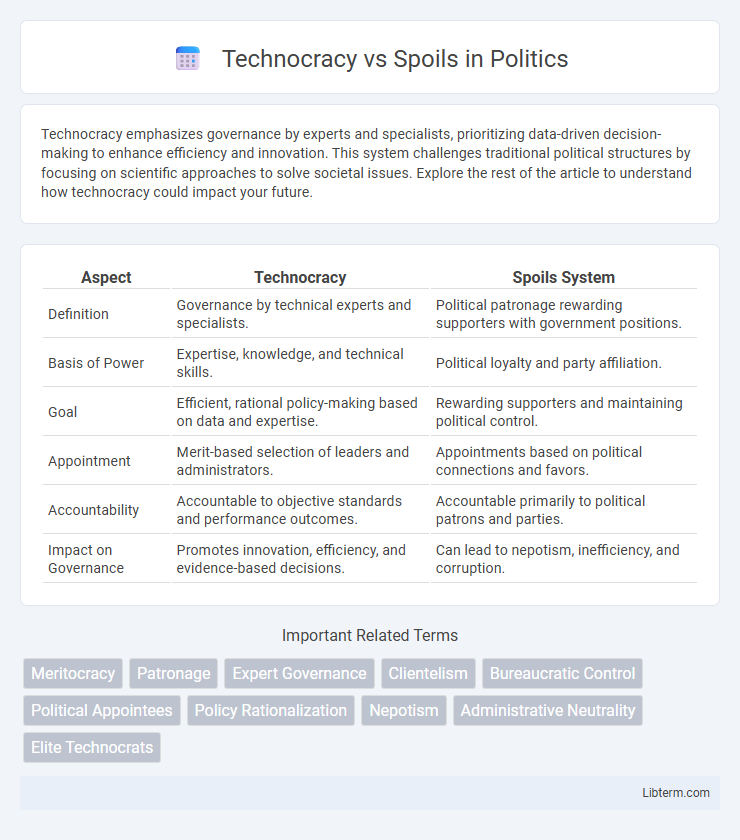Technocracy emphasizes governance by experts and specialists, prioritizing data-driven decision-making to enhance efficiency and innovation. This system challenges traditional political structures by focusing on scientific approaches to solve societal issues. Explore the rest of the article to understand how technocracy could impact your future.
Table of Comparison
| Aspect | Technocracy | Spoils System |
|---|---|---|
| Definition | Governance by technical experts and specialists. | Political patronage rewarding supporters with government positions. |
| Basis of Power | Expertise, knowledge, and technical skills. | Political loyalty and party affiliation. |
| Goal | Efficient, rational policy-making based on data and expertise. | Rewarding supporters and maintaining political control. |
| Appointment | Merit-based selection of leaders and administrators. | Appointments based on political connections and favors. |
| Accountability | Accountable to objective standards and performance outcomes. | Accountable primarily to political patrons and parties. |
| Impact on Governance | Promotes innovation, efficiency, and evidence-based decisions. | Can lead to nepotism, inefficiency, and corruption. |
Understanding Technocracy: Principles and Origins
Technocracy is a governance system where decision-makers are selected based on expertise and technical knowledge, particularly in science and engineering, rather than political affiliations or popular vote. It originated during the early 20th century amid industrialization and the Progressive Era, emphasizing efficiency, rational planning, and meritocracy to address complex economic and social problems. The core principles prioritize data-driven policy, expert management of resources, and reducing political patronage, contrasting sharply with the spoils system's focus on political loyalty and patronage appointments.
The Spoils System: Definition and Historical Context
The Spoils System, also known as patronage, is a political practice where government jobs and favors are awarded to loyal supporters and party members, rather than based on merit or qualifications. Originating in the United States during Andrew Jackson's presidency in the 1820s and 1830s, this system institutionalized political favoritism and often led to widespread corruption and inefficiency in public administration. The Spoils System starkly contrasts with technocracy, which emphasizes expertise and professional management in governmental roles.
Core Values: Merit vs. Patronage
Technocracy emphasizes meritocracy, where individuals are selected based on expertise, skills, and qualifications to ensure effective governance and informed decision-making. The core value of merit promotes efficiency, competence, and innovation by prioritizing technical knowledge over political affiliations. In contrast, the spoils system operates on patronage, rewarding political supporters with positions regardless of qualifications, often leading to inefficiency and corruption.
Efficiency and Expertise: The Technocratic Edge
Technocracy emphasizes decision-making based on specialized knowledge and expert analysis, leading to higher efficiency in policy implementation and resource management. Unlike the Spoils system, which prioritizes political loyalty and often results in patronage appointments, technocracy ensures that qualified professionals handle governance tasks, reducing corruption and inefficiency. This expertise-driven approach enhances the quality of public services and fosters sustainable economic development.
Political Loyalty and Rewards: Inside the Spoils System
The Spoils System relies heavily on political loyalty, rewarding supporters with government jobs and contracts regardless of qualifications, thereby prioritizing partisan allegiance over expertise. This patronage approach contrasts sharply with Technocracy, where appointments are based on merit, technical skills, and specialized knowledge to ensure efficient governance. Political rewards in the Spoils System often undermine administrative competence and foster corruption, whereas Technocracy aims to depoliticize public service for objective policy implementation.
Governance Outcomes: Comparative Analysis
Technocracy-driven governance emphasizes expertise and data-driven decision-making, often resulting in efficient policy implementation and reduced corruption levels. In contrast, spoils systems prioritize political loyalty and patronage, which can lead to inefficiencies, nepotism, and reduced public trust. Comparative studies reveal that technocratic models tend to enhance governance outcomes by fostering transparency and meritocracy, while spoils-based systems frequently undermine institutional effectiveness and long-term development.
Public Trust and Accountability
Technocracy emphasizes decision-making based on expertise and data, fostering higher public trust through transparent, evidence-driven policies and clear accountability mechanisms. Spoils system relies on political patronage and appointments, often leading to public distrust due to perceived favoritism and lack of merit-based accountability. Public confidence is generally stronger in technocratic systems where officials are selected for competence rather than partisan loyalty.
Corruption Risks: Which System Prevails?
Technocracy minimizes corruption risks by emphasizing expertise, transparency, and merit-based decision-making, reducing opportunities for favoritism and bribery. In contrast, the spoils system inherently fosters corruption through political patronage, where appointments and resources are distributed based on loyalty rather than competence. Empirical studies consistently show lower instances of corrupt practices and greater institutional integrity under technocratic governance compared to spoils-driven administrations.
Modern Examples: Technocracy vs. Spoils in Today’s World
Modern examples of technocracy versus spoils systems highlight contrasting governance approaches, with countries like Singapore exemplifying technocracy through merit-based, expert-driven decision making, while some democracies struggle with patronage and political appointments favoring spoils. The COVID-19 pandemic response showcased technocratic efficiency in nations relying on scientific expertise, whereas others experienced governance challenges tied to nepotism and political favoritism. This ongoing global debate underscores the impact of technocratic leadership on policy effectiveness compared to the short-term gains favored by spoils systems.
The Future of Government: Trends and Challenges
The future of government increasingly favors technocracy, where data-driven decision-making and expertise guide policy development, over the spoils system characterized by patronage and political favoritism. Emerging trends indicate a shift toward transparency, accountability, and merit-based appointments, addressing challenges such as corruption and inefficiency. Governments integrating advanced technologies like AI and blockchain aim to enhance public trust and streamline administrative processes.
Technocracy Infographic

 libterm.com
libterm.com